And the world stood still
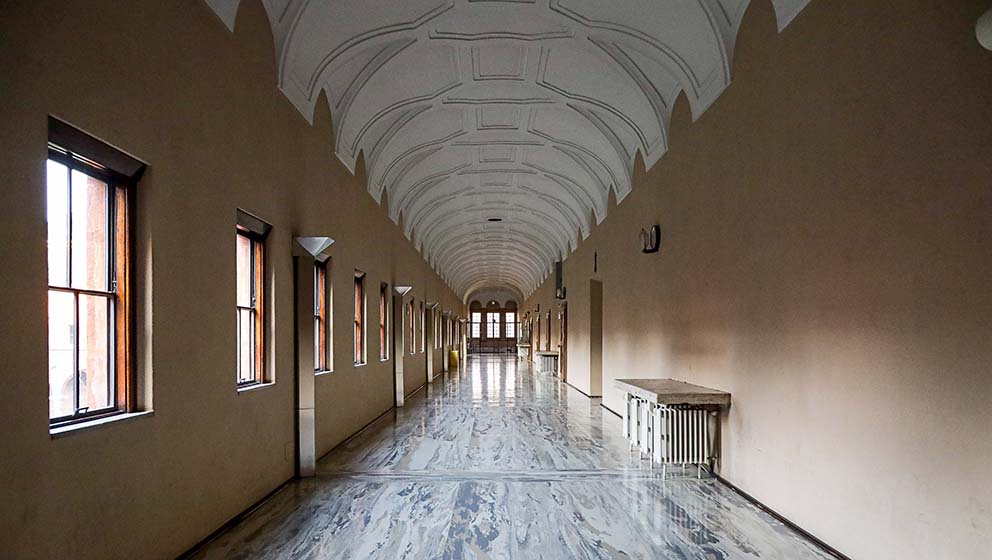
When the first COVID-19 cases were discovered in the Lombardy region, life for millions of people changed overnight and Università Cattolica had to promptly react to the emergency, safeguarding the health of its students and staff.
On February 20, the bars opened at the break of dawn. Saucer plates clunk against the tazze as the bartenders pressed the coffee machines, whirring them to life. Residents flocked in the streets with their agenda in mind. The public and private transports crowded the roads with impatient horns and revving engines. The metros hustled, the neighbors interacted, the employees worked, the schools taught, the restaurants fed, and the shops remained open.
At Università Cattolica del Sacro Cuore, the campus flourished. The students sauntered to their classrooms. The professors set up their materials before classes began. The staff started working on their respective tasks.
A few days later, the news about COVID-19 took off.
As a higher education institution, Università Cattolica suspended its in-person academic activities starting from February 24, following the news about the gradual spread of COVID-19 in Lombardy and Emilia-Romagna. Its foremost intention was, and still is, to safeguard the health of its students and staff.
Sara Bombardieri, an undergraduate student of the University, flicked her television on and came across the news
update on COVID-19 in Italy. Since the reports talked about the preventive measures of the country, she checked
whether Università Cattolica had already released details about what would happen with the classes at the University.
There, on the university app, the message popped up from the Rector, suspending in-person academic activities of the students following the news stories around COVID-19.
“I had kept tabs on the progress of the news about the virus. I wasn’t surprised when the University had to close and suspend the face-to-face lessons. It is a reasonable decision to make since the University is a place where a lot of people interact. But I was quite sure I would be back the week after,” Sara says, bringing up the extended suspension of teaching at the University after a series of alarming increases of COVID-19 cases in Italy.
The University has split up into several working teams who have been at the helm of informing the students and staff through email messages, university app and website, as well as social media platforms. It has created a dedicated email address and points of contact to reach for queries and information requests about COVID-19.
After the suspension of face-to-face didactic activities, the University has worked with its academic staff on how they could carry on with teaching through the resources they have on hand. They have enhanced their online teaching platform to better cater to webinars, interactive presentations, lecture notes, and even online discussion boards.
Although the University did not foresee a pandemic situation such as COVID-19, it has prioritized its students in its decision-making for the academic activities, choosing what they believe would fit and be best for the students’ needs.
The information the University sends per week opens up to include preventive measures the students and staff need to comply with, hotline numbers to call and email addresses to message in case of questions, and constant updates from the Rector and Faculty Deans about the exams, thesis presentations, graduations, and remote classes.
“What I appreciate from the messages and updates I receive from the University is the constant attention paid to students who are asked to respect the measures and protect themselves. As I stay home, I can catch up on the lessons through the video classes online and to reflect on what I will do once I am back at the university,” Sara says.
Not far from the domestic level, a concern blooms in the midst of the dilemma: how about those who are abroad,
pursuing their international programs and studies?
The international branch of the University, led by Dr. Edilio Mazzoleni, Director of Global Engagement and International Education, has ensured that the students abroad and international students who decided to stay in Italy are well-informed about the crisis. The international team follows the rules by the book, acting on the emergency policies laid out by the University and assessing which ones can be implemented for the unexpected case of COVID-19.
When the breakout flared up, the international team reached out to their students abroad.
They informed them and did not assume those who were abroad had already known, or at least not in its depth, about the epidemic. They verified students’ queries since some information that had circulated a few days before was inaccurate.
There are countries where various messaging apps are blocked or do not function properly. To resolve this, the international team has used an in-house built app that geolocalizes students and has a direct messaging function embedded in it. This is called the Safety App. It fires notifications to the students abroad and opens the line of communication between them and the international team.
There are students and parents who worry about their health situation in the country where they are staying. The international team has found and resorted to special health insurance that covers COVID-19 and invited the students to sign up for their welfare. They coordinated with Università Cattolica’s partner universities and health clinics to tend to the students in need abroad as part of their insurance coverage.
The international team has set up contact points between the University and Italian consulates and embassies across the globe. Such action guarantees access to communications and responses for the students in case of emergencies.
“Once we learn about an urgent situation from any of our students abroad, we assess it first. Then, we find solutions for it and keep in touch with our embassies or consulates. It is not the International Office that can act on the solutions or decisions. Our authority is to make sure that students know what is going on and how long it will take to find a solution.
What is important is to be able to communicate with those who are abroad or in Italy, stay in contact with them, and explain the situation,” Dr. Mazzoleni says.
When the World Health Organization declared COVID-19 a pandemic, the students abroad were even more encouraged to use the Safety Package that they had received from the International Office before their departure, to reach out to the University. The package contains the above mentioned
ready-to-install messaging app with GPS (Safety App), a list of emergency hotline numbers that are open 24/7, and the health insurance that covers cases such as COVID-19. On top of that, students have access to medical centers in the country where they are staying which answers the call in 13 different languages.
Amidst the situation, the parents of students, who are still abroad or, being international, decided to stay in Italy, have expressed their strong concerns to the University. Bearing in mind that all students are of age, the international team informs the parents about the situation and gives fact-checks to the reports they have on hand. They share their sentiments and assure them by firing responses that are factual, firm, and still full of understanding.
There are in-person academic activities that have been suspended as well for the international students in Italy and domestic students abroad of the University. The goal of the international team is to be able to work with their partner institutions abroad and the resources they have on hand.
“When several countries banned entry to and from Italy, our international students were invited by their home institutions to go back as part of their emergency plans. On the same night, our team decided to offer the majority of our courses for mobility programs online, which was approved the day after by the Rector, Professor Franco Anelli. Since most of the students had been far away for too long since the beginning of the semester in their home country, we decided to offer them the opportunity of not missing their semester credits.
As for our domestic students abroad, we got in contact with our partner universities and asked them if it would be possible for our students to take their subjects remotely. Most of them are able to provide the courses online,” Dr. Mazzoleni says.
The switch from in-person teaching to remote classes has taken manpower and prompt responses. While the emergency response and plan of Università Cattolica have been in place for a long time, they are not all-encompassing with the solutions for a pandemic case such as COVID-19. The international team had to react overnight and as quickly as possible as they decided the path of academic activities to take while keeping in mind what would be best for the students and staff.
Rayane Salloum, an international student from Lebanon, finds it easy to catch up with her lessons through the online lectures. “The spread of the virus took me by surprise. I stayed in Italy despite the situation. The professors have been helpful and opted for recorded lessons which I find
convenient. I am able to follow them at my own pace. There are professors who have opened online discussion boards to pick up where we left from our last face-to-face lecture. Some Professors have dedicated live sessions with us to answer our questions. When in doubt, we can contact them through email, chat, or even a video conference,” she says.
Emilie Brøndum-Jensen, an international student from Denmark, checks her email to see whether her professors have uploaded new video lectures. “I appreciate how my professors make sure that we continue our studies at home. They upload new videos and materials every week and answer our questions quickly. Some of them even do live sessions with us to make the lessons more interactive. Instead of feeling as if we are wasting our time being quarantined at home, we are quite busy thanks to the online lessons and materials,” she says.
Technical issues over online materials cannot be avoided, but Luca Baussola, an undergraduate student of the University, reaches out to his professors to address the problems.
“We settle with a compromise where they re-upload the video or create a new one. There are also supplementary materials, just in case the video fails to load. They assure that advance. It may not be perfect, but they are working their best to give us the lectures we need,” he says.
Professor Giovanna Mascheroni, an Associate Professor of Sociology of Media and Communication at Università Cattolica, admits that the online classes are her first attempt at remote teaching. She has set up an online blog forum to provide an interactive feedback-based channel where her students can apply and test what they have learned in their uploaded videos and materials by commenting on and engaging with the online community. “My background in sociology, media and communications helps me become
aware that digital media can be helpfully employed in practices of a collective sense-making. Since my students come from all over the world, I thought this could be an opportunity for them to interact, share their everyday lives in this informal online space, and find a notion of normality for a while to reduce their anxieties,” she says.
COVID-19 propels Università Cattolica to ponder. In times like this, institutional emergency protocols deem high importance. It darts everyone to take sound and grounded actions. It guides the personnel on how decisions should be made or what sequence of steps to take.
“Emergency protocols for higher education institutions should be developed and it is evident why.
They tell you what you need to do, who to contact, and how to carry out your plans. It is part of our responsibility to have them on hand once urgent cases like this occur,” Dr. Mazzoleni says.
“With the remote classes that the University is doing now, it is difficult to disregard the pursuit of online education.
Blended learning is a tool of this generation and maybe the future.
It is time to study what works and what does not in learning, and we can start that by looking into the means of communication. It is our responsibility to learn and understand these means, such as social media platforms, to better educate our students.
We need to devise a model that can be the standard of this practice then do our best not to move down that bar. As a higher education institution, we need to take a step further in being more well-rounded and inclusive in education,” Dr. Mazzoleni adds. As for the continuity of online education,
he is positive that the university will delve further into its possibility.
There is a sanctuary of solace that buzzes in Italy. Buried in the worried eyes of the residents speaks a resolute belief that everyone will paddle safely to the shore. For now, the students of Università Cattolica nod well to the remote classes. The teaching staff tap into the means of communication to enhance their modes of teaching delivery. The administrative team indulges in providing the best service to local and international students, and members of the university.
In the deserted streets, Italian flags hang outside the windows. The green, white, and red streaks glimmer as the sun rises on the first day of Spring. Its rays glare at the flags, smearing the fragrance of patriotism. In other areas, spray paints fringe white cloths with Italy’s vision in the near future: Andrà tutto bene. Everything will be okay.
The metros will hustle, the neighbors will interact, the employees will work, the schools will teach, the restaurants will serve, and the shops will open again.
AND EVERYONE WILL WATCH THE REVIVAL UNFOLD.
Article featured on Worldbound, edition n.4-2020.


 Community engagement. Apart but not alone
Community engagement. Apart but not alone Faculty. Standing together for Science - Professor Roberto Cauda
Faculty. Standing together for Science - Professor Roberto Cauda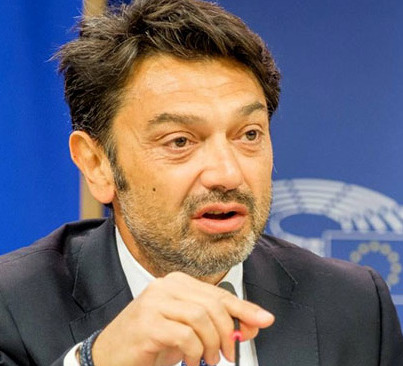 Tech news. Riding the new digital wave - Federico Rajola, Director of ILAB (Center for Digital Innovation)
Tech news. Riding the new digital wave - Federico Rajola, Director of ILAB (Center for Digital Innovation)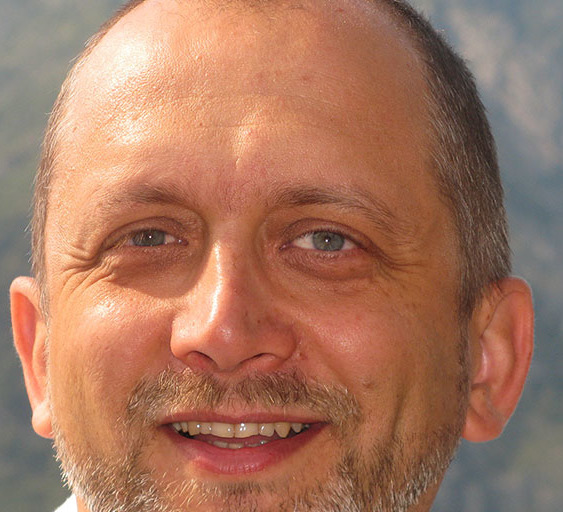 Tech news. Riding the new digital wave - Giuliano Pozza (Chief Information Officer at Cattolica)
Tech news. Riding the new digital wave - Giuliano Pozza (Chief Information Officer at Cattolica)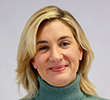 Meet the experts. Higher Education Internationalizations VS COVID-19 - Léa Senn, Università Cattolica del Sacro Cuore
Meet the experts. Higher Education Internationalizations VS COVID-19 - Léa Senn, Università Cattolica del Sacro Cuore Meet the experts. Higher Education Internationalizations VS COVID-19 - Gianluca Samsa, Università Cattolica del Sacro Cuore
Meet the experts. Higher Education Internationalizations VS COVID-19 - Gianluca Samsa, Università Cattolica del Sacro Cuore Meet the experts. Higher Ed Internationalizations VS COVID-19 - Gary Rhodes, California State University at Dominguez Hills
Meet the experts. Higher Ed Internationalizations VS COVID-19 - Gary Rhodes, California State University at Dominguez Hills Student mobility in the time of COVID-19. Corrado Cavalli, exchange student at Hanyang University (Seoul, South Korea)
Student mobility in the time of COVID-19. Corrado Cavalli, exchange student at Hanyang University (Seoul, South Korea) International students. Student voices from the lockdown
International students. Student voices from the lockdown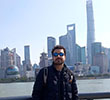 Student mobility in the time of COVID-19. Andrea Riccio, Exchange student at Groupe ESSCA Shanghai (Shanghai, China)
Student mobility in the time of COVID-19. Andrea Riccio, Exchange student at Groupe ESSCA Shanghai (Shanghai, China)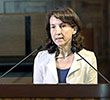 Looking forward. A conversation with Professor Antonella Sciarrone Alibrandi
Looking forward. A conversation with Professor Antonella Sciarrone Alibrandi